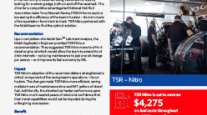Diesel Gains 0.7¢ to $2.808
This story appears in the Nov. 9 print edition of Transport Topics.
The sudden run-up of U.S. retail diesel fuel prices moderated last week, as the average price rose just 0.7 cent to $2.808 a gallon, the Department of Energy reported. Fleet executives, however, said the respite isn’t easing their cost pressures.
The diesel average price had climbed 20.1 cents, or almost 8%, for the two weeks before the report last week. Gasoline prices followed suit last week, gaining 2 cents to $2.694 after climbing 18.5 cents in the prior two weeks, DOE said after its Nov. 2 survey of fueling stations.
Crude prices rose modestly last week, closing at $79.62 a barrel on Nov. 5 after starting the week by settling at $78.13. Analysts quoted by Bloomberg News linked the latest increase to a reduction in fuel inventories.
“Higher fuel prices have made a bad situation worse,” said Michael Moran, vice president of Moran Transportation Corp., Elk Grove Village, Ill.
“When fuel prices are constant, customers get used to it, and when they change, [customers] throw it on the table as a bargaining chip,” he told Transport Topics. “Obviously, lower fuel prices are better.
The second-best thing is having fuel at a stable price so it becomes a non-issue.”
Keith Tuttle, president of Motor Carrier Service Inc., Northwood, Ohio, agreed.
“Even though we do as much as we can from a cost-per-mile perspective, we don’t think there is any way for us as an industry or our company to figure this out,” he told TT. “We just sit back and take it when fuel prices go up. We don’t have the sledgehammer to get the necessary fuel surcharges.”
“Fuel prices have gone up 23 cents a gallon,” said Joseph Greenstein, vice president of Midwest Motor Express, Mounds View, Minn. “The fuel surcharge does help, but the rising cost of fuel hurts us more. The fuel surcharge just takes out some of the sting.”
In a Nov. 2 report, the Oil Price Information Service blamed a “mini-bubble” in commodity prices for recent increases, citing a spike in contracts to buy oil since May as prices rose steadily.
Six months ago, diesel was at $2.185, and has risen 29% to last week’s price, which was the highest since Nov. 17. One year ago, diesel was at $3.088 and gasoline was $2.40 a gallon.
OPIS noted that while distillate stocks have been reduced in recent weeks, inventories still are about 30% higher than the three-year average. At the same time, demand trails last year by three percentage points, the report said.
Fleet executives had varying views about how to better manage costs.
“We watch everything vigilantly — our idle times, top speeds and measuring individual trucks on a daily, weekly or monthly basis, with as much control as we can to get as much fuel mileage as we can,” said Tuttle, whose fleet saves up to 15 cents a gallon buying fuel in bulk at terminals.
“We are trying to convince some of our customers to possibly let us hedge their fuel and almost fix their fuel surcharge on a three-month or six-month basis,” he added. “There is some interest in the idea that they know what they are going to pay.”
Midwest Motor Express uses broker FuelQuest to find the best prices for bulk purchases at company terminals, Greenstein said. Midwest is evaluating software to enhance monitoring of idling and individual drivers’ performance, he added.
The less-than-truckload carrier faces a particular challenge with fuel costs because of the long distances it travels in four thinly populated states it serves: Montana, North Dakota, South Dakota and Wyoming.
“One thing that is an advantage for us is the ability to run combinations in those states,” said Greenstein, such as twin 48s. Without them, he said, the company would have difficulty operating profitably.
Moran had a different view, saying he doesn’t fault shippers that ask for a break on fuel surcharge costs.
“It’s more on my comrades [in trucking] than anyone else,” he said. “Carriers continue to price at or below cost, whether they realize it or not. We cannot take the fuel surcharge and the fuel cost and play games with them.”
“In the last two weeks when prices rose, fuel has become more of an issue — we’ve been fielding . . . a lot more questions,” Moran added, noting that customers often want to pay just part of the fee.
“Everyone wants us to lower their charges,” he said. “Fuel is our largest or second-largest expense. It is not something that I can negotiate. I have to pay it.”
Shippers typically won’t pay any surcharge for shipments moving from the East Coast to the Midwest, a backhaul market, Tuttle said.
“Most of the shippers have been very understanding about the fuel surcharge,” Greenstein said. “Some of the more sophisticated shippers and third parties have their own fuel surcharge that they require us to use.”




